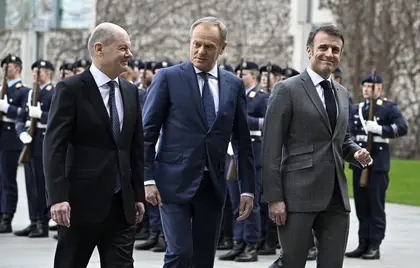German Chancellor Olaf Scholz hosted French President Emmanuel Macron in Berlin on Friday after tensions between the leaders recently blew out into the open over differences on how to support Ukraine.
After a clear-the-air meeting in the chancellery, the pair will be joined by Polish Prime Minister Donald Tusk for urgent consultations on further European military backing for Kyiv.
JOIN US ON TELEGRAM
Follow our coverage of the war on the @Kyivpost_official.
Ukraine has faced a series of battlefield setbacks in repelling Russian troops, as its forces have faced critical shortages of ammunition and Western military aid has dried up.
A massive US aid package of $60 billion remains blocked in Congress by right-wing Republicans, and President Joe Biden has acknowledged that $300 million of stopgap support announced on Tuesday was "not nearly enough".
It falls to Paris, Berlin and Warsaw "to mobilise all of Europe" to provide Ukraine with fresh aid, Tusk said.
But simmering disagreements between Macron and Scholz threatened to undermine cooperation between the allies.
Debates between France and Germany "may have culminated in what we have seen in the last weeks, but there have been difficulties for quite a long time now", said Nico Lange, an analyst for the Munich Security Conference (MSC).
- 'Calculated effort' -
The summit of the so-called Weimar Triangle of European powers in Berlin was a "good sign that finally... the errors are corrected to some extent", Lange said.

Sweden Reveals Drone Swarm Project Based on Lessons From Ukraine
Germany's European partners have been frustrated by Scholz's refusal to provide its long-range Taurus missiles to Ukraine, despite urgent calls from Kyiv.
The chancellor, on the other hand, reacted angrily to Macron's refusal to rule out sending troops to Ukraine and his pointed comments urging allies not to be "cowards".
With his comments, the French president sought "to restore a certain level of strategic ambiguity" to complicate Russian President Vladimir Putin's decision-making, said Jacob Ross from the German Council on Foreign Relations (DGAP).
As well as provoking a debate on where to draw the line on help for Ukraine, the remarks may also have been a "calculated effort" to rally Eastern European allies, Ross said.
But the pressure from Macron has also shone a spotlight on glaring differences with Scholz.
German soldiers participating in the conflict is "a limit that I, as chancellor, do not want to cross," Scholz told parliament on Wednesday.
This applied not just to the deployment of army personnel in Ukraine but also to any potential operational planning in Germany, he said in outlining his reasons for refusing to supply Taurus missiles.
At no point should German soldiers help select "where will be targeted... where will be hit", Scholz said, a service he has suggested French officials provide to Ukraine for the long-range Scalp missiles supplied by Paris.
Macron, too, remained combative late on Thursday when he told French television that a Russian victory in Ukraine "would reduce Europe's credibility to zero", insisting that the continent's security was "at stake".
He said Europe must be "ready to make sure that Russia never wins this war".
And he said that anybody advocating "limits" on aid to Ukraine "chooses defeat".
- 'Different opinions' -
Friday's meeting is of "great importance" for allies to "organise as much support as possible for Ukraine", said Scholz, who spoke on Thursday with Ukraine's President Volodymyr Zelensky by telephone and underlined Germany's "unbroken solidarity" with Kyiv.
Germany has been Ukraine's single largest backer after the United States, but European efforts to mobilise support have faced challenges.
The EU is pushing to bolster weapons and ammunition production by its defence industry, but with the war in its third year, it is still struggling to ramp up output.
"True solidarity with Ukraine? Less words, more ammunition," Tusk said on X, formerly Twitter, ahead of the meeting.
Poland has been one of Ukraine's staunchest allies, and the presence of Tusk, a seasoned politician who previously served as European Council president, would help "moderate differences" in French-German relations, Lange said.
On Ukraine, it was in the overarching interest of both to "move closer together," he said.
You can also highlight the text and press Ctrl + Enter






